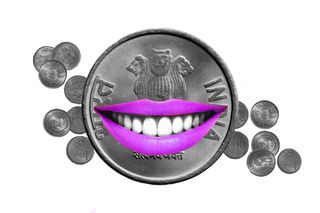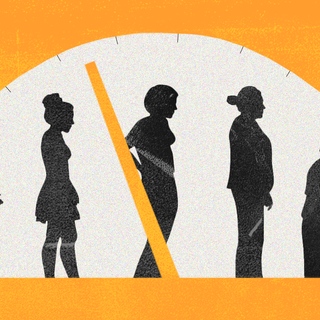
When Money Can — and Can’t — Buy Happiness, According to Research
Money does make us happier — at least to an extent.

Let’s talk about money and joy. Some years back, a Lexus ad boldly claimed: “Whoever said money can’t buy happiness isn’t spending it right.” The message seemed to hint at the possibility of a good life, the road to which has money growing on trees along the way. The currency to a happy life required tangible, monetary currency. Then there is the more abstract, philosophical argument about chasing happiness through other immaterial means; the quixotic notion of finding the happiness within you sounds quite blasé and tiresome by now.
It is a question most enduring in the science of human wellbeing: Can money ever buy happiness? Surely, it can — money can solve tangible problems that come with the ordeal of survival. Money pays rent, buys food, and puts a roof over our heads, among other things. But if it could indeed buy happiness,why would billionaires, with their fat bank accounts, ivory towers, and space vacations, feel lonely and/or try to fill their lack of contentment at the expense of people, environment, and ideas that build a civilization?
The marriage of money and happiness has intrigued psychologists and economists alike. There is a canon of research dedicated solely to answering how financial security impacts our mood, and if it indeed, makes us happier. The long and short of it is money does make us happy — to an extent — and that extent is never a well-defined threshold.
Money guarantees bliss especially for people impacted by poverty or economic turmoil. We go back to 2010, when an important study based in the U.S. anchored much of the debate, arguing that money can make you happier but not beyond an annual income of $75,000 (north of Rs. 58 lakhs after inflation adjustment). The exact limits of money aside, other research to come after, concurs with this largely: in 2017, a Gallup poll surveyed people from around the world, and found a sweet spot: people found emotional wellbeing when they earned something between $60,000 and $75,000 (Rs. 46 lakhs and 58 lakhs). People also attested to feeling a sense of satiation — the peak of happiness, if you will — if they earned somewhere around $95,000 (Rs. 75 lakhs).
In 2018, a study looked at the emotional benefits of regular cash transfers to women in poverty-stricken households in Zambia. Over the next two years, the women reported greater satisfaction in life, both their own and their children. Money meant access to nutritious food, homes, healthcare, and dignity of life that could improve physical and mental health — simplifying the pursuit ofhappiness. We know poverty is both a cause and consequence of poor mental health, but the true extent of mental health conditions in marginalized communities remains underresearched.
Related on The Swaddle:
According to Jayshree Sengupta, economist and author, India’s chronic unhappiness is a result of congestion in cities, concerns about food security and water safety, rising costs of healthcare, women’s safety, and environmental degradation which itself is linked to poor mental wellbeing. Thisexplains why India remains at the bottom of the happiness index rankings.
A consensus thus arises: income matters. If one has money, they have the luxury and logistical wherewithal to pursue things they desire, or just meet basic survival needs. But the exact degree depends on this distinction between “day-to-day” happiness (experienced wellbeing) and overall life satisfaction (evaluative well-being). A sizeable literature shows that people with larger incomes tend to report greater evaluative well-being. One limitation of this canon of research is just how much can you truly measure someone’s experienced well-being, from a daily lens?
In 2021, Matthew Killingsworth, a senior fellow at the Wharton School of the University of Pennsylvania, provided a more comprehensive and slightly contrarian outlook onthis relationship. “…researchers have used surveys to ask people how they remember feeling during some period in the past, such as the last day, week, or month. This requires people to accurately remember how they felt across the various moments of the past and then accurately integrate those memories into a single estimate, an approach that is vulnerable to memory errors and biases in judgment,” the study noted.
Published in PNAS, the research showed that money correlated with happiness, irrespective of what the income levels looked like. The conclusion was based on data gathered in real-time over the course of seven years; looking at 33,391 employed adults in the U.S. earning as little as meeting the minimum wage to making more than $500,000 a year. Happiness never plateaued for people who were earning more than $75,000; “higher incomes are associated with both feeling better day-to-day and being more satisfied with life overall,” he wrote.
Then one may wonder, why exactly is money even linked to misery? Psychology and behavioraleconomics come under the spotlight here. “We always think if we just had a little bit more money, we’d be happier, but when we get there, we’re not,” Catherine Sanderson, a psychology professor at Amherst College, told TIME. This paradox of joy is familiar: the more we earn, the more we want, and the less satisfied we feel overall. According to one research, a person is twice as likely to be happy if they go from earning $20,000 a year to more than $50,000; but the levels of happiness kind of flatline after the $90,000 mark. So incomes over $75,000 bought life satisfaction, but happiness not so much.
Related on The Swaddle:
How Languages Reflect a Culture’s Idea of Happiness
Perhaps, because people always overestimate how much joy can be found by having more money, we forget that as adaptable creatures, people adjust to variations in wealth. A new house, a YSL bag, a shiny new car are all great, but we are bound to get used to them — a phenomenon that economists call the “hedonistic treadmill.” Money is also linked to greater stress and even conflicts in relationships. “Materialism is not an isolated life priority; as the pursuit of money and possessions are prioritized, it appears that other dimensions of life, such as relationships, are deemphasized,” as the researcher of one such study noted. The pursuit of money creates a scarcity of time for more emotionally rewarding things in life, thus impacting satisfaction in relationships.
Beyond income levels, money correlates with happiness in other aspects too. According to one survey from 2011, when people spent money on “experiences” — such as a visit to an adventure park, a vacation, or buying a gift for someone you love — over tangible goods (the pair of shoes you’ve been eyeing), they reported feeling greater feelings of happiness.
This is also linked to something called the “appraisal-tendency framework.” A review of literature about emotions and decision-making found how we value something based on the outcome we expect to come out of a said thing. “For example, if you’re afraid of your house being broken into, buying a state-of-the-art home security system may reduce your level of fear, which can then improve your happiness or emotional wellbeing,” as Healthline explained. Wealth earmarks not all kinds of possibilities, only some.
Then there is a theory to happiness oft-ignored. People may find joy when they turn objects of their purchase into experiences. “A book that sits unread on a bookshelf is a thing; a book you plunge into with gusto, savoring every plot twist, is an experience,” David Futrelle wrote in TIME. Futrelle spoke to psychologist Tom Gilovich, who further argued that “people who are happiest are those who are best at wringing experiences out of everything they spend money on, whether it’s dancing lessons or hiking boots.”
A more sustainable way of finding money and bliss, then, seems to be by way of investing in relationships and people. Any human connection is linked to unquantifiable benefits on moods and happiness. So, spending on dinners and dates is quite literally an investment in this pursuit of happiness.
I think of bell hooks, and her treatise on joy: “Loving friendships provide us with a space to experience the joy of community in a relationship where we learn to process all our issues, to cope with differences and conflict while staying connected.”
Saumya Kalia is an Associate Editor at The Swaddle. Her journalism and writing explore issues of social justice, digital sub-cultures, media ecosystem, literature, and memory as they cut across socio-cultural periods. You can reach her at @Saumya_Kalia.
Related


UN Chief Urging Graduates to Not Work for ‘Climate Wreckers’ Puts the Onus of Climate Action on Individuals
